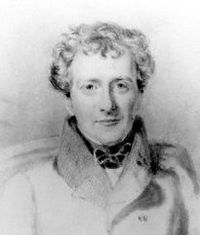Annotation:Oh No! We Never Mention Her (1): Difference between revisions
No edit summary |
No edit summary |
||
| Line 2: | Line 2: | ||
---- | ---- | ||
<p><font face="garamond, serif" size="4"> | <p><font face="garamond, serif" size="4"> | ||
'''OH NO! WE NEVER MENTION HER.''' English, Air. C Major. Standard tuning (fiddle). AABB. A sentimental song by Thomas Haynes Bayly (1797-1839), an English poet and playwright who also penned "[[Long Long Ago]]." | '''OH NO! WE NEVER MENTION HER.''' English, Air. C Major. Standard tuning (fiddle). AABB. A sentimental song by Thomas Haynes Bayly (1797-1839), an English poet and playwright who also penned "[[Long Long Ago]]." Bayly initially studied for the law, following his father, then tried for the clergy before finding a livelihood in writing. Although he wrote for the theater and for newspapers, he is remembered today for his sentimental songs (he wrote both lyrics and melody). The title of the present piece is taken from the lines: | ||
[[File:bayly.jpg|200px|thumb|left|Thomas Haynes Bayly]] | [[File:bayly.jpg|200px|thumb|left|Thomas Haynes Bayly]] | ||
<blockquote> | <blockquote> | ||
Revision as of 18:00, 26 September 2014
Back to Oh No! We Never Mention Her (1)
OH NO! WE NEVER MENTION HER. English, Air. C Major. Standard tuning (fiddle). AABB. A sentimental song by Thomas Haynes Bayly (1797-1839), an English poet and playwright who also penned "Long Long Ago." Bayly initially studied for the law, following his father, then tried for the clergy before finding a livelihood in writing. Although he wrote for the theater and for newspapers, he is remembered today for his sentimental songs (he wrote both lyrics and melody). The title of the present piece is taken from the lines:

Oh no! we never mention her,
Her name is never heard;
My lips are now forbid to speak
That once familiar word. Oh no! we never mention her.
The song was quickly adapted. In fact, Bayly originally wrote it referencing a male character, "We never mention him," quickly converted to the other sex. The song was a parodist's delight and spawned numerous sets of lyrics. As evidenced by some American printed sheet music covers, it was also adapted and performed on the minstrel stage.
Source for notated version:
Printed sources: Howe (Complete Preceptor for the Accordeon), 1843; p. 24.
Recorded sources:
